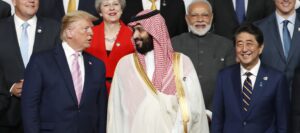
 BY EMILY TAMKIN
BY EMILY TAMKIN
GETTY
Then US president Donald Trump with Saudi Arabia’s Crown Prince Mohammed bin Salman, pictured in June 2019 at the G20 summit in Japan
America’s relationship with the Middle East’s two rival powers must become more multilateral and with a stronger grounding in human rights.
Something was shifting in American public consciousness – or at least liberal-leaning American public consciousness – during the Trump years.
The typical thinking in Washington, DC has long been that Saudi Arabia is a security partner and Iran a security threat. There have been periods when this has been less true – for example, after 9/11, when it was discovered that the majority of the perpetrators were from Saudi Arabia – but this has been generally the conventional wisdom.
Yet the vulgarity with which Donald Trump made that same case created space for his detractors to question this long-held establishment view. When, for example, the former president said that he would not punish Saudi Arabia for the murder in 2018 of Jamal Khashoggi, a US resident and journalist, because Saudi is a reliable purchaser of US arms, America was confronted with an uncomfortable truth: that it was willing to sell out its purported values for the price of some weapons.
Similarly, when Trump unilaterally pulled out of the Iran nuclear deal and proceeded to sanction and threaten Iran, or when he began his last year in office by killing Iranian general Qasem Soleimani, some wondered whether it was prudent to take such an aggressive approach to Iran. Would it not be better, as some lawmakers put it to me in 2018 after Khashoggi’s death, for the US to take a step back from the Saudi partnership and stop crafting policy in the Middle East primarily to isolate Iran?
There was some reason to believe that Joe Biden would do what Trump had not. As a candidate, Biden pledged to make Saudi Arabia a “pariah” and to rejoin the Iran nuclear deal. But a little over a month into the new president’s administration, progress has been mixed.
The United States has ended its support for the Saudi-led war in Yemen and is reportedly planning to stop the sale of “offensive” weapons to Saudi Arabia. Yet when the declassified US intelligence report on Khashoggi’s murder was made public last week, the Biden administration announced it would not sanction Mohammed bin Salman, the Saudi crown prince and heir apparent, whom the report said was ultimately responsible for Khashoggi’s murder. Representative Ilhan Omar, a progressive member of Congress from Minnesota, put forth a bill to sanction the crown prince after it became clear that the Biden administration would not.
Biden has also not so far rejoined the Iran nuclear deal, or entered formal negotiations to do so, and has conducted a military strike in Syria to retaliate against Iran-backed militia without congressional authorisation. Representative Ro Khanna, one of the leading voices against the war in Yemen, spoke out against the strike.
[Also listen to: The Iranian Playbook]
Despite what has undoubtedly been a disappointing month for some progressives, however, Biden is still altering America’s regional relationship, but slowly.
“I don’t expect [the] recalibration to be radically reforming or transforming [of] the relationship,” said Yasmine Farouk, a visiting fellow in the Middle East programme at think tank the Carnegie Endowment for International Peace.
What should be expected, she said, is for the US-Saudi relationship to be more “institutionalised,” in that policy will go through traditional channels rather than being shaped by the whims of the president and his inner circle, as was the case under Trump. The longstanding privileged access Saudi Arabia has had with Washington policymakers will likely be further reduced. And all of that, she said, can be achieved without sanctioning the crown prince. Avoiding the latter is important since it would probably be a unilateral move, thus running counter to another Biden promise: the return of multilateral cooperation.
Furthermore, what Biden has done so far has already changed Saudi behaviour, Farouk noted. In the past two months, Saudi women’s rights activist Loujain al-Hathloul was released from jail and the country healed its rift with its fellow Gulf nation Qatar.
There’s also the reality that, at least on the Iran nuclear deal, Biden can’t change the status quo on his own. Candidate Biden may have said he would do certain things on foreign policy, Farouk said, but realising his campaign promises also depends on the extent to which the other parties are willing to collaborate.
Recalibration and re-engagement in the Middle East also can’t simply mean swapping one regional nemesis for another, added Esfandyar Batmanghelidj, founder of Bourse & Bazaar Foundation, a think tank focused on economic development and diplomacy in the Middle East and Central Asia. “The principal way in which human rights issues are dealt with by the West [is by making an] effort to isolate countries committing human rights violations,” he said. If the go-to strategy in dealing with human rights violators is to isolate them, then it is also difficult to bring them to the table to press for domestic, diplomatic and regional change.
That paradigm needs to change, according to Batmanghelidj. That isn’t to say progressives shouldn’t continue to press the Biden administration to implement better, less militaristic policy. But if isolating Iran wasn’t sound policy, then isolating Saudi Arabia likely won’t be either, Batmanghelidj said: the point is to change America’s relationship in both cases so that it’s more diplomatic and multilateral, and with a stronger grounding in human rights.
That will take time. But there is “still the potential”, Batmanghelidj said, “that the United States will have a different role in the region at the end of these four years than at the end of [the past] four decades”.
[See also: Why should Joe Biden’s foreign policy be different?]
Emily Tamkin is the New Statesman’s US editor.
She co-hosts our weekly global affairs podcast, World Review.



